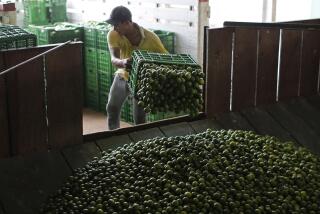Troops, Wage Boost End Banana Strike
- Share via
LA LIMA, Honduras — Bowing to an army occupation of the company town of La Lima and its sprawling plantations, Honduras’ banana workers union accepted a government-proposed wage boost and returned to work Monday, ending a seven-week strike against a giant multinational fruit grower.
The settlement Sunday night was a relief not only for Honduras’ premier private employer, Chiquita Brands International, but also for the civilian government of President Rafael L. Callejas, which faced down a threatened general strike by dozens of other unions in support of the banana workers’ demand for a larger increase.
Rene Ayestas, president of the 10,000-member banana union, said he called off the strike because other unions balked at a prior agreement to confront the government after it sent army and riot police squads to crush the strike. The troops protected strikebreakers trucked by Chiquita to the banana fields and packing plants.
“How could we win?” a dejected Ayestas asked reporters in his office, decorated by posters depicting Chiquita as an octopus with its tentacles controlling the country’s power centers. “We had the company, the government and the army against us. The other unions did not come to our defense.”
Reflecting on the Honduran trade union movement, reputed to be the strongest in Central America, the strike leader added: “The rank and file ought to analyze the kind of leadership they have and reconsider whether those leaders are there to defend the interests of the working class or to reap personal benefits.”
The strike, the longest and costliest in Honduras since 1954, was the first crisis for Callejas’ six-month administration. Forced to abandon his conciliatory style, the president imposed radio censorship and threatened a state of siege after the union rejected his wage proposal Friday. The gamble worked, helping him hold the line on wages in defense of an economic recovery program.
Based on a 50% devaluation of the lempira, the economic program has trimmed Honduras’ public deficit, raised its export income and restored its credit with international lenders. But the currency adjustment has triggered inflation and eroded real wages to a degree unknown here in decades.
Government officials said the labor settlement, a wage increase averaging 17%, will not upset the economic program. But they estimated strike costs at $15 million in lost export income and $3.5 million in uncollected taxes. Bananas earn more than a third of Honduras’ foreign exchange and Chiquita is by far the largest grower.
Honduras and other banana producing countries are enjoying booming demand for their fruit. Two months ago the Cincinnati-based Chiquita firm lost some of its independent Honduran banana suppliers in a highly publicized legal battle with Fyffes Group Ltd., an Anglo-Irish fruit importer with an eye on Eastern Europe.
Mindful of the growing value of bananas, the union first demanded a 60% wage increase from Chiquita. It argued that the currency devaluation had produced an $18-million windfall for the company. Chiquita, battered by a strike in each of the last four years, offered token raises until talks broke down last month. Then it accepted the government proposal for a 95-cent raise in daily wages ranging from $3.81 to $9.30.
Chiquita’s workers are among the best paid in Honduras. They live in company houses and get free schooling and medical care. In rejecting the government proposal and demanding an additional 5%, union leaders overestimated the commitment of poorer workers to rally behind them, officials said.
“The other unions asked, ‘Why should we stop eating so these workers can get a heftier increase than we did?’ ” presidential adviser Gilberto Goldstein said. “We knew this strike was unpopular. That’s why we could act decisively.”
More to Read
Sign up for Essential California
The most important California stories and recommendations in your inbox every morning.
You may occasionally receive promotional content from the Los Angeles Times.













